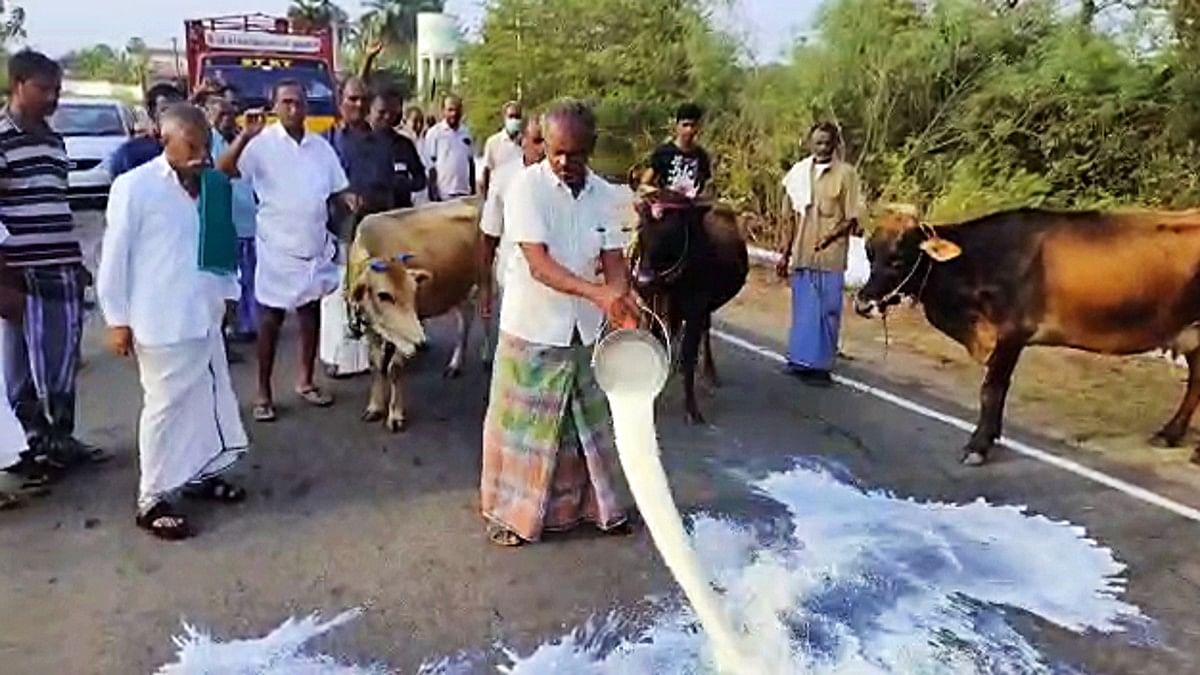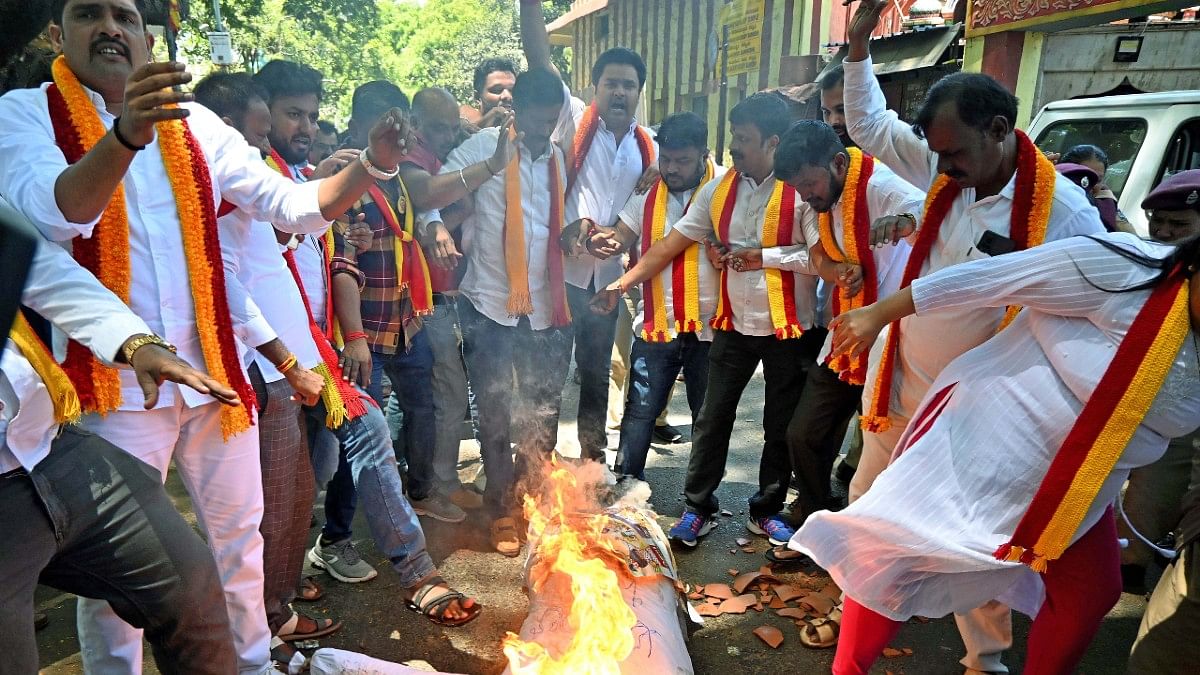Chennai: Tamil Nadu CM M.K. Stalin has written to Union Home Minister Amit Shah, asking him to direct Amul to “desist from procuring milk” from the state. In his letter, Stalin said that Amul’s decision to procure milk from producers in Tamil Nadu was “unfortunate” and “detrimental to the interest of Aavin” — the apex cooperative marketing federation in the state which procures, processes and sells milk and milk products.
Stalin added that the Kaira District Cooperative Milk Producers’ Union (Amul) “has utilised their multi-state cooperative licence, to install chilling centres and a processing plant in Krishnagiri District”.
The Gujarat-based cooperative, he said, plans to “procure milk through FPOS (farmer producer organisations) and SHGs (self-help groups) in and around Krishnagiri, Dharmapuri, Vellore, Ranipet, Tirupathur, Kancheepuram and Tiruvallur districts” in Tamil Nadu.
The decision of AMUL to operate in Tamil Nadu is unfortunate, detrimental to the interest of Aavin and will create unhealthy competition between the cooperatives.
Regional cooperatives have been the bedrock of dairy development in the states and are better placed to engage and… pic.twitter.com/yn2pKINofO
— M.K.Stalin (@mkstalin) May 25, 2023
In Tamil Nadu, a three-tier dairy cooperatives system has been functional since 1981, benefiting rural milk producers and consumers, under the ambit of Aavin, which is owned by the Tamil Nadu Cooperative Milk Producers Federation Limited.
Emphasising that the move by Amul will create “unhealthy competition” between cooperatives, Stalin added that it has “been a norm in India to let cooperatives thrive without infringing on each other’s milk-shed area”.
“Such cross-procurement goes against the spirit of ‘Operation White Flood’ and will exacerbate problems for the consumers given the prevailing milk shortage scenario in the country,” read the letter to Shah, who is also the Minister for Cooperation.
Stalin also said that “regional cooperatives have been the bedrock of dairy development in the states and are better placed to engage and nurture producers”.
He added that 9,673 milk producers’ cooperative societies are currently functional in Tamil Nadu’s rural areas and that they procure milk to the tune of “35 lakh litre per day (LLPD)” from “4.5 lakh pouring members” under the ambit of Aavin cooperative.
Crediting Aavin for supplying quality milk to consumers at “one of the lowest prices in the country”, the DMK chief said that Aavin assures producers of remunerative and uniform prices throughout the year. “To increase and sustain milk production in Tamil Nadu, Aavin also provides various inputs such as cattle feed, fodder, mineral mixture, animal health care and breeding services for animals of milk producers,” he wrote.
Stalin further added that “Aavin plays a vital role in improving the livelihood of rural milk producers and meeting the nutritional requirements of consumers”.
Reacting to the letter, Bharatiya Janata Party (BJP) Tamil Nadu chief K. Annamalai accused Stalin of ‘diverting people’s attention’. “Is the Tamil Nadu CM wary of the fact that Aavin’s milk procurement in TN on the overall milk produced in the state is only 14 per cent,” he asked.
The @arivalayam govt had to heed to @BJP4TamilNadu’s protest and cancel procurement of sweet boxes from Pvt party and were compelled to buy them from Aavin. @BJP4TamilNadu thoroughly exposed the @arivalayam govt for not considering Aavin milk powder in the Nutrition kit tender… https://t.co/3ARNxsIEUh
— K.Annamalai (@annamalai_k) May 25, 2023
Also Read: ‘No other option’ — behind Amul price revisions, a battle against soaring costs in Gujarat’s dairies
Suppliers’ strike & procurement price
In March this year, members of one of the three different associations supplying milk to Aavin halted supply, demanding a hike in procurement prices citing competitive prices offered by private players.
Against that backdrop, Tamil Nadu Milk Producers Welfare Association (TNMPWA) general Secretary M.G. Rajendran told ThePrint that the decision of Amul and other private players to set up units in Tamil Nadu could affect Aavin. “Between Aavin and private players, there is a price difference of Rs 8 to Rs 10 per litre. This competitive procurement price makes several producers shift to private companies and this is not good,” he said.

Aavin cooperative society saw a dip in procurement to 26-27 LLPD over the last few months, Rajendran added.
Since October 2022, all three associations supplying milk to Aavin, including the one headed by Rajendran have been urging the Stalin-led DMK government in the state to increase the procurement price of milk to Rs 10 per litre. The state government had in November 2022 hiked the procurement price by Rs 3 — to Rs 35 from Rs 32 in the case of cow milk and to Rs 44 from the earlier Rs 41 in the case of buffalo milk.
Though the protest in March fizzled out within days, the three associations have now approached newly-appointed dairy minister Mano Thangaraj with their demand. “The minister has asked us to come back with a written recommendation of all issues and requirements. He has promised us that the ministry will support us,” said Rajendran.
Dairy is increasingly becoming a political issue in southern India, as was evident in March when a direction by the Food Safety and Standards Authority of India (FSSAI) to print dahi (the Hindi word for curd) on curd packets marketed by milk federations in Tamil Nadu and Karnataka elicited a sharp backlash in both states, forcing FSSAI to scrap the order.

In Karnataka, where assembly elections were held earlier this month, Amul’s announcement to sell milk in Bengaluru had led to the Opposition accusing the then-incumbent BJP of hatching a ‘sinister’ plot to wipe out Karnataka Milk Federation-owned (KMF) brand Nandini, which was projected as an extension of Kannada identity.
Members of a pro-Kannada outfit even staged a protest in Bengaluru last month against the sale of Amul products in the state, alleging that the Union government had hatched a ‘conspiracy’ to merge Nandini with Amul.
(Edited by Amrtansh Arora)
Also Read: Polson to Amul—Gujarat farmers helmed white revolution. First they took on a Parsi dairy



